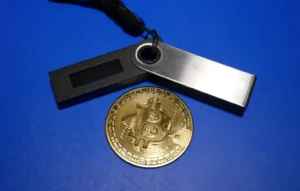The importance of hardware wallet security of cryptocurrencies safe cannot be overstated. As the value and popularity of cryptocurrenc like Bitcoin and Ethereum keep increasing, the need for strong security to protect them also rises.
Understanding Hardware Wallet Security Of Cryptocurrencies

Hardware wallet security offer a solution to the dangers that come with online wallets and exchanges. They provide a secure way to store cryptocurrencies offline, making them safe from hacking and other cyber threats. Hardware wallets, also known as cold wallets, are physical devices used to store the private keys needed to access and manage cryptocurrencies.
Unlike hot wallets, which are connected to the internet and more vulnerable to online attacks, hardware wallets store private keys offline. This makes them very secure. Hardware wallets come in different forms, such as USB-like devices and smart cards. They are designed to be easy to use while offering strong security.
The Growing Threat of Cyber Attacks
As the value of cryptocurrencies rises, cybercriminals are always finding new ways to steal them. Phishing attacks, malware, and hacking attempts on exchanges are some of the threats faced by cryptocurrency holders. Hardware wallets help reduce these risks by keeping private keys offline and away from cybercriminals.
4 Benefits Of Hardware Wallet Security
- Offline Storage: Storing private keys offline eliminates the risk of online theft.
- Security Features: Most hardware wallets come with extra security features like PIN codes and recovery phrases to further protect funds.
- Ease of Use: Despite their advanced security, hardware wallets are designed to be easy to use, making them suitable for both new and experienced users.
- Compatibility: Hardware wallets work with a wide range of cryptocurrencies, allowing users to store different digital assets securely in one place.
Several well-known hacks and security breaches in the cryptocurrency world have shown the importance of hardware wallets. In 2014, Mt. Gox, the biggest Bitcoin exchange at the time, went bankrupt after losing 850,000 Bitcoins to hackers. Similarly, in 2016, the Bitfinex exchange lost 120,000 Bitcoins in a security breach. These events emphasize the need for secure storage options like hardware wallets.
How Hardware Wallets Work
Hardware wallets generate and store private keys offline. This ensures that they are never exposed to the internet. When a user wants to make a transaction, the hardware wallet signs the transaction with the private key stored on the device. The signed transaction is then sent out to the network, allowing the user to safely transfer funds without exposing their private keys.
Hardware wallet security is important for keeping cryptocurrency holdings secure. They provide an offline storage solution that is resistant to hacking, offering a level of security that online wallets and exchanges cannot match. As the value of cryptocurrencies continues to rise, hardware wallet security is a smart choice for anyone looking to protect their digital assets from cyber threats
See Also: When Is The Best Time To Trade Crypto?
Choosing the Right Hardware Wallet

Choosing the right hardware wallet security is really important for keeping your cryptocurrency safe. There are a lot of options out there, so it can be hard to know which one is best for you. But if you think about things like security features, compatibility, and how easy it is to use, you can find a hardware wallet that works well for you and helps you feel confident about your cryptocurrency.
Things To Consider When Choosing Your Hardware Wallet Security
1. Security Features
When you’re looking for a hardware wallet, it’s important to make sure it has good security features. Look for wallets that use encryption, secure chip technology, and a PIN code to keep your private keys safe from people who shouldn’t have them. It’s also a good idea to look for wallets that let you use multiple signatures to approve transactions, because that makes it even harder for someone to steal your cryptocurrency.
2. Compatibility
Another thing to think about is whether the wallet supports the cryptocurrencies you want to store. Most hardware wallets work with popular cryptocurrencies like Bitcoin and Ethereum, but some might not support less well-known coins. So, make sure the wallet you choose works with the cryptocurrencies you have.
3. Easy to Use
You also want to find a hardware wallet that’s easy to use, especially if you’re new to cryptocurrency. Look for wallets that are simple to set up and use, with clear instructions and an interface that makes sense. It’s also helpful if the wallet lets you back up your keys easily and use it with your phone or tablet.
4. Reviews
Before you buy a hardware wallet, it’s a good idea to see what other people think about it. Look for reviews from other users to see what they say about its security, reliability, and customer support. If a lot of people say good things about a wallet, it’s more likely to be a good choice.
5. Price
While price shouldn’t be the only thing you think about, it’s important to consider how much you want to spend on a hardware wallet. Some wallets are more expensive than others, so think about what features are important to you and how much you’re willing to pay for them. Remember, a hardware wallet is an investment in the security of your cryptocurrency, so it’s worth spending a bit more to get one that’s secure and reliable.
Popular Hardware Wallets
There are a few hardware wallets that are really popular and well-regarded. Some of the most popular ones include Ledger Nano S, Trezor Model T, and Keep Key. These wallets are known for being secure, working with lots of different cryptocurrencies, and being easy to use. But remember, it’s important to do your own research to make sure you’re getting a wallet that’s right for you.
Choosing the right hardware wallet is really important for keeping your cryptocurrency safe. By thinking about things like security features, compatibility, ease of use, what other people say, and price, you can find a hardware wallet that works well for you. Make sure to do your own research and choose a wallet from a reputable manufacturer to keep your cryptocurrency safe and secure.
See Also: 6 Best Indicators for Crypto Trading
Setting Up and Using a Hardware Wallet

Setting up you hardware wallet security is an important step in keeping your cryptocurrency safe. Hardware wallets add an extra layer of protection by storing your private keys offline, making it harder for hackers to steal your funds compared to online wallets.
Setting Up Your Hardware Wallet
Setting up a hardware wallet is easy. Here are the general steps:
- Unboxing: Carefully unpack your hardware wallet and ensure everything is included.
- Installing Software: Most hardware wallets require you to install software on your computer or smartphone. This software is used to manage your cryptocurrency.
- Initializing the Wallet: Follow the on-screen instructions to initialize your hardware wallet, create a new wallet, and set up a PIN code.
- Backing Up Your Recovery Phrase: During setup, you’ll receive a recovery phrase. Write down this list of words and store it in a safe place. This phrase is essential for recovering your wallet if it’s lost or damaged.
- Transferring Cryptocurrency: After setting up your hardware wallet, you can transfer cryptocurrency to it using the receive address provided by the software.
Using Your Hardware Wallet
Using a hardware wallet is secure and straightforward. To access your cryptocurrency, connect your hardware wallet to your computer or smartphone and enter your PIN code. Once connected, you can send or receive cryptocurrency using the software provided by the wallet manufacturer. Hardware wallets are important tools for keeping your cryptocurrency safe.
By choosing the right hardware wallet, setting it up correctly, and using it securely, you can protect your cryptocurrency from unauthorized access and ensure its safety. Remember to keep your recovery phrase safe and never share it with anyone.
See Also: Best Crypto Trading Strategies for Beginners and Experts 2024
Security Tips

Cryptocurrency security is very important. As more people get into cryptocurrency, the risk of theft and hacking goes up. Hardware wallets are a key way to keep your cryptocurrency safe. But, they only work if you use them right. In this subheading, we’ll talk about the best ways to use hardware wallets and keep your cryptocurrency safe.
Some Security Tips For Hardware Wallets
1. Use Strong Passwords and PINs
When you set up your hardware wallet, use strong passwords and PINs. Don’t use easy-to-guess information like birthdays or names. A strong password should be at least 12 characters long and have a mix of letters, numbers, and symbols. Your PIN should also be unique and hard to guess.
2. Turn on Two-Factor Authentication (2FA)
Many hardware wallets offer two-factor authentication (2FA). This adds an extra step to the login process. Even if someone steals your hardware wallet, they still need your 2FA code to access your cryptocurrency.
3. Keep Your Recovery Phrase Safe
When you set up your hardware wallet, you’ll get a recovery phrase with 12 to 24 words. This phrase is used to recover your wallet if it’s lost or damaged. Keep this recovery phrase in a safe place, like a secure location or a safe deposit box. Don’t share your recovery phrase with anyone.
4.Regularly Update Your Wallet’s Firmware
Manufacturers regularly release updates to fix bugs and improve security. Check for updates regularly and install them right away. Updating your wallet’s firmware makes sure you have the latest security features.
5. Watch Out for Phishing Attempts
Phishing is when hackers try to trick you into giving them sensitive information. Be careful of emails, messages, or websites that ask for your wallet information. Make sure the sender is legit before giving out any information.
6. Keep Your Wallet Offline When Not in Use
When you’re not using your hardware wallet, keep it disconnected from your computer or phone. This lowers the risk of it being hacked by malware or hackers. Only connect your wallet when you need to make a transaction.
7. Use a Secure Connection
When you connect your hardware wallet to a computer or phone, use a secure connection. Avoid public Wi-Fi networks, as they can be hacked easily. Use a private, trusted network to connect your wallet safely. Hardware wallets are a safe way to store your cryptocurrency. But, you need to use them correctly and take security measures to keep them safe.
By using strong passwords, turning on 2FA, and keeping your recovery phrase safe, you can protect your cryptocurrency from theft and hacking. Stay aware of potential threats to your wallet’s security and be careful with your information.
Disadvantages Of Hardware Wallets
Let’s see at the disadvantages of hardware wallet security.
- Cost: Hardware wallets can be expensive compared to other types of wallets. While the initial cost might be worth it for some users, others might find it too expensive, especially if they don’t have a lot of money to spend.
- Limited Support: Not all cryptocurrencies are supported by hardware wallets. This can be a problem for users who have a wide variety of digital assets.
- Physical Vulnerability: Even though hardware wallets are more secure than online wallets, they can still be damaged or lost. If a hardware wallet is lost, stolen, or damaged, the cryptocurrency stored on it might be lost forever.
- Complexity: Setting up and using a hardware wallet can be complicated, especially for users who aren’t familiar with cryptocurrency technology. This complexity can be a barrier for new users who are looking for a simple way to store their digital assets.
- Dependency on Manufacturer: Hardware wallets are created and maintained by specific manufacturers. If a manufacturer goes out of business or stops supporting a hardware wallet, users might not be able to access their funds.
- Limited Accessibility: Unlike online wallets, hardware wallets require physical access to the device to access funds. This can be inconvenient for users who need to access their funds frequently or while they’re on the go.
- Risk of Counterfeits: Because hardware wallets are popular, there’s a risk of counterfeit devices being sold. Using a counterfeit hardware wallet can compromise the security of your cryptocurrency.
- Lack of Privacy: While hardware wallets offer a high level of security, they don’t offer the same level of privacy as some other types of wallets. Transactions made using a hardware wallet can still be traced back to the user’s public address.
See Also: Bitcoin Halving: Why Its Important In 2024
In conclusion, hardware wallets play an important role in securing cryptocurrency holdings. They offer a safer alternative to online wallets by keeping private keys offline. This reduces the risk of theft and hacking. When choosing a hardware wallet, it’s important to consider factors like security features, compatibility, and ease of use.
Setting up and using a hardware wallet requires careful attention to security practices, such as using strong passwords, enabling two-factor authentication, and keeping the recovery phrase safe. Regularly updating the wallet’s firmware and being wary of phishing attempts are also essential.
By following these best practices and security tips, users can greatly enhance the security of their cryptocurrency holdings. Overall, hardware wallets are a reliable and effective way to protect your cryptocurrency investments.
Fintrills hopes this article has been able to improve your trading knowledge. For more free trading tutorials, cryptocurrency and forex news updates, join our telegram channel via the link below

